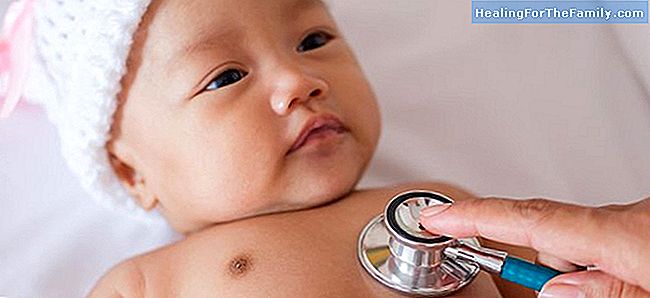Most common diseases in babies 0 to 1 year
During the first year of life, the baby's illnesses are frequent and sometimes dangerous. It is very important to consult with pediatricians when we have doubts about the baby's condition. In the first months of life (less than 3 months) infections can be serious, so if the baby has a fever should b
During the first year of life, the baby's illnesses are frequent and sometimes dangerous. It is very important to consult with pediatricians when we have doubts about the baby's condition. In the first months of life (less than 3 months) infections can be serious, so if the baby has a fever should be checked in a hospital, where they will usually perform a blood and urine test.
Knows the important diseases in the first year of the baby's life

The most frequent infections during the first year of the baby are:
1. Respiratory infections (cold in the upper respiratory tract, pneumonia, bronchiolitis).
Respiratory infectionscan affect the upper tract(cold of the upper tract), in which case it is a frequent but mild disease. The child is uncomfortable due to nasal congestion and cough, can eat a little less, and usually improves with nasal washes and humidity.
If it affects thelower respiratory tractthe disease is more serious. It may be a bronchiolitis (involvement of the bronchioles) that sometimes requires hospital admission and specific treatment. It can also be pneumonia, which if they are of bacterial etiology require antibiotic treatment (oral or intravenous if they require admission).
2. Otitis
Otitis is one of the most frequent infections. It is a generally bacterial infection, sometimes as a complication of a cold in the upper airways, and which, according to age, can evolve well without antibiotics or requiring antibiotics. In the first year of life, they must be treated with antibiotics. They are often very annoying and painful, the baby wakes up crying at night and does not want to eat because his ear hurts when he swallows.
3. Gastroenteritis
Gastroenteritis is also very frequent, usually of viral origin, which does not require specific treatment, but it does need to bevery constant with oral hydration. The baby should drink enough fluid (oral rehydration serum) to avoid dehydration. The baby may have vomiting, diarrhea or both.
4. Urine infections
Urine infections should be ruled out before a baby less than one or two years old with fever without a clear focus. A urine test strip will be made, which will give us an idea of whether you have an infection or not and a urine culture will be collected before starting the antibiotic treatment. Sometimes depending on the age of the child and according to their involvement of the general state require hospital admission.
5. Skin infections
Skin and soft tissue infectionsusually require antibiotic treatment (oral or topical depending on the case), and sometimes also hospital admission. Some infections with cutaneous involvement, such as exanthematic diseases (chicken pox, measles, rubella, sudden rash, infectious urticaria ...) are viral in origin and do not usually require antibiotic treatment except in specific cases of superinfection or complications.












